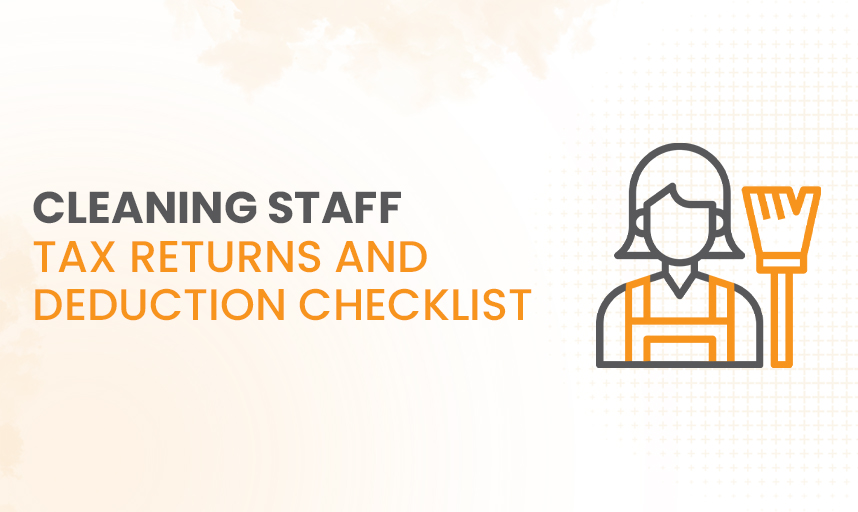Cleaning Staff Tax Returns and Deduction Checklist

As a cleaning staff personnel, you scrub, polish, you strive to keep the place as clean as possible. Let’s face it, you work hard.
Well, as a dedicated cleaning professional, maximising your income is crucial.
Yet, during tax season, you might unknowingly be leaving money on the table. But fear not.
This comprehensive guide will walk you through the ins and outs of cleaning staff tax returns and provide a detailed deduction checklist to ensure you claim every penny you’re entitled to.
Tax Deduction Checklist For Cleaning Staff
As a dedicated cleaner, you prioritise the cleanliness and comfort of others.
But don’t forget to uphold your financial well-being!
Following is a checklist that can keep on track when it comes to tax deduction
Essential Tools
-
Equipment Purchases: Vacuums, mops, buckets, sprayers, and any other equipment crucial for your cleaning activities are fully claimable. This includes new purchases as well as the cost of replacing broken or worn-out items.
-
Maintenance and Repairs: Keep those receipts for replacing vacuum belts, repairing mops, or fixing any equipment malfunction. The cost of maintaining your cleaning tools is also a legitimate deduction.
-
Consumables: Don’t let dust cloths, sponges, cleaning chemicals, or garbage bags go unnoticed. Any consumable item directly related to your cleaning work is deductible, even if it costs less than $10. Simply track the total amount spent throughout the year.
Uniforms and Protective Gear
If your employer requires a specific uniform or provides protective gear like gloves or masks, you can claim their cost and cleaning/repair expenses.
Remember, this excludes ordinary clothing you can wear outside of work.
Transportation
-
Car Expenses: If you regularly transport heavy equipment between cleaning jobs and lack secure storage at work, car-related expenses are deductible. Choose the method that suits you best:
-
Logbook Method: Keep a detailed log of work-related journeys for at least 12 consecutive weeks, including odometer readings. Claim the actual business-use percentage of your car expenses, including fuel, oil, and repairs.
-
Cents-per-kilometre method: Claim a set rate per kilometre travelled for work purposes (check the ATO website for the current rate). This method is simpler but may not maximise your deductions.
-
Public Transport: Train, bus, or even taxi fares incurred for work-related travel are claimable. Remember, personal travel and reimbursed expenses are not deductible.
Phone and Internet Costs
If you use your own phone or device for work purposes, such as making or managing appointments, and your employer doesn’t provide a phone or reimburse the costs, you can claim phone and internet expenses. Remember to keep records for claims over $50.
Self-Education Costs
Continuous learning is commendable. If you attend courses, training, or seminars directly related to your cleaning job, the associated costs, including course fees and materials, can be claimed.
Home Office Expenses
In an era of remote work, home office expenses are relevant. If you need to do some work at home, you can claim running costs like power, heating, cooling, lighting, phone costs, and even the decline in the value of equipment used for work.
Travel Expenses
Cleaners often move between job locations. Travel expenses, including flights, bus and train fares, taxi fares, and even accommodation and food costs if staying away from home overnight, can be claimed.
Gifts and Charity Donations
If you’ve made contributions to charities during the financial year, these can be claimed as deductions.
Work-Related Subscriptions and Memberships
Fees for professional associations, memberships, and union fees related to your cleaning profession are deductible.
Tax Agent Fees
Seeking professional tax advice comes with a cost, but this expense is deductible.
Other General Expenses
Various other expenses, including work-related subscriptions, stationery, work bags, license renewals, and more, can be considered for deduction.
Importance Of Record Keeping For Cleaning Staff
To ensure a successful tax return, maintaining accurate records is crucial. Keep digital or physical copies of receipts, including the supplier’s name, expense amount, nature of goods or services, payment date, and document date. While physical receipts are necessary for expenses over $10, digital copies are acceptable for smaller amounts.
Conclusion
While tax season may not be the most exciting time, being well-informed about available deductions can significantly impact your income as a cleaner.
Hopefully, this blog has provided you with detailed insights into the cleaning staff tax returns, ensuring you handle the process with confidence and maximise your financial returns.
And if you require any professional help in filling your tax returns, you can reach out to KPG Taxation. Their experienced tax accountants will ensure you get the right claims and maximise your potential tax savings.- Categories
- Tax Return

Focus On Growing Your Business, Leave The Accounting On Us!
- Income Tax : File your taxes & get the best claims & returns.
- Accountancy : Hire expert accountants to manage your transactions.
- Bookkeeping : Let us handle your record books and expense reports.
- Business Advisory : From company set-up to payroll, we handle it all.



